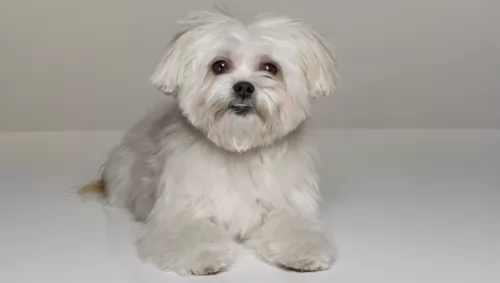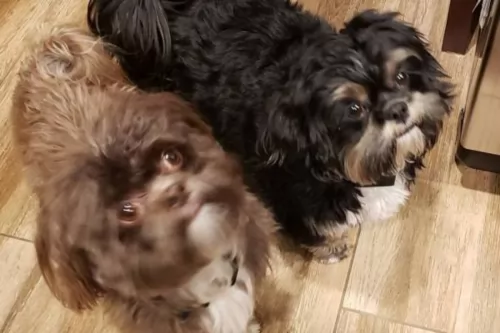 Petzlover
Petzlover Kyi-Leo is originated from United States but Nova Scotia Duck-Tolling Retriever is originated from Canada. Kyi-Leo may grow 24 cm / 9 inches shorter than Nova Scotia Duck-Tolling Retriever. Kyi-Leo may weigh 17 kg / 37 pounds lesser than Nova Scotia Duck-Tolling Retriever. Both Kyi-Leo and Nova Scotia Duck-Tolling Retriever has almost same life span. Both Kyi-Leo and Nova Scotia Duck-Tolling Retriever has almost same litter size. Both Kyi-Leo and Nova Scotia Duck-Tolling Retriever requires Moderate Maintenance.
Kyi-Leo is originated from United States but Nova Scotia Duck-Tolling Retriever is originated from Canada. Kyi-Leo may grow 24 cm / 9 inches shorter than Nova Scotia Duck-Tolling Retriever. Kyi-Leo may weigh 17 kg / 37 pounds lesser than Nova Scotia Duck-Tolling Retriever. Both Kyi-Leo and Nova Scotia Duck-Tolling Retriever has almost same life span. Both Kyi-Leo and Nova Scotia Duck-Tolling Retriever has almost same litter size. Both Kyi-Leo and Nova Scotia Duck-Tolling Retriever requires Moderate Maintenance.
 The Kyi-Leo first came about in the 1950s in San Francisco, USA, with the crossing of two dog breeds – the Lhasa Apso and the Maltese.
The Kyi-Leo first came about in the 1950s in San Francisco, USA, with the crossing of two dog breeds – the Lhasa Apso and the Maltese.
Because this is a mixed-breed dog, it isn’t recognized by the American Kennel Club, but it is recognized by some of the other dog associations such as the American Rare Breed Association or ARBA as it is known. Today the dog is looked upon as a designer breed.
 The Nova Scotia Duck Tolling Retriever dog was bred in the 19th-century in Nova Scotia, Eastern Canada.
The Nova Scotia Duck Tolling Retriever dog was bred in the 19th-century in Nova Scotia, Eastern Canada.
They were used as hunting dogs. Known as the ‘Toller’, the dog was at first referred to as the Little River Duck Dog but it was in 1945 that it became officially recognized by the Canadian Kennel Club as a pure breed.
The dog is a mix of retriever, setter, spaniel and possibly a farm collie mix breed. It was in 1980 that the breed gained national recognition, being declared the provincial dog of Nova Scotia in 1995.
 The Kyi-Leo is a small dog standing at 20 – 30cm in height and weighing in the region of 4 – 6kg.
The Kyi-Leo is a small dog standing at 20 – 30cm in height and weighing in the region of 4 – 6kg.
He has a long, silky coat which is essentially black and white or grey/silver and white or even gold and white. He has frail legs which can become injured or broken in vigorous rough and tumble games.
You can certainly describe the Kyi-Leo as a sweet, quiet, non-aggessive playful dog, and for anyone who wants a splendid pet and companion, this dog makes a great family pet and he won’t cost you an arm and a leg to feed either.
He also has an acute sense of hearing and this turns him into an excellent ‘alarm’ watch-dog. It is also a dog, that while he will love to join you on a walk, he isn’t a dog that is going to demand a lot of exercise.
He responds well to his human family, is easy-going and gentle, tending to be cautious around strangers. You can trust him to be an awesome playmate for children. In this instance, it’s the children who should be warned when playing with a dog like this as, because of his fragile build, he could easily be injured by children who haven’t been taught to respect animals.
Even though he is such an amicable pet, it will still be of benefit to you and him to have him trained and socialized. Then he responds well to basic commands such as sit, stay and lie-down.
Dogs who spend time with their family, pick up on the ‘culture’ of the family and they learn how to behave. Dogs who are left on their own and never socialized can become nervous and aggressive towards people as they never got to learn how to behave – they weren’t socialized.
 The Nova Scotia Duck Tolling Retriever is a medium-sized gundog. Both male and female stand at about 42 to 54cm in height and they weigh anything from 17 to 23kg.
The Nova Scotia Duck Tolling Retriever is a medium-sized gundog. Both male and female stand at about 42 to 54cm in height and they weigh anything from 17 to 23kg.
This beautiful dog is looked upon as the smallest of the retriever dogs. He has a remarkable medium-length, feathery red, copper or golden coat with some white markings and a long feathery tail with medium length, floppy ears. The coat will need brushing twice a week.
He is a powerful dog and also agile with a somewhat worried expression on his face. The expression becomes bright and animated when he is busy working and you’ll notice that the feathery tail is held high with confidence and delight when he is busy working or doing some activity he loves.
The Nova Scotia Duck Tolling Retriever is an intelligent, alert dog who is eager to please its owners.
They are affectionate dogs too, making a splendid family pet. If you’ve got kids in the home, you can trust this dog to get on well with them.
He is energetic, thriving on both physical and mental stimulation. He’ll love a walk every day as this will give him the chance to get out and sniff around. He won’t be content though with just a walk and will want ball games, walks in the park, hikes and swimming. This dog loves water and is well equipped for it with his double coat and webbed paws.
 The Kyi-Leo is everything you want in a family companion – active, playful, loving, gentle, happy and balanced.
The Kyi-Leo is everything you want in a family companion – active, playful, loving, gentle, happy and balanced.
He loves his human family but tends to be a little bit wary around strangers, gradually warming to them.
He may be small, but he is robust and alert, and he is also capable of making you a good watchdog.
The Kyi-Leo is an all-round great little pet to have.
 Your Toller is a high energy dog, and with the right family he is going to be an absolute joy to have. Give him lots of activities to stimulate him physically and mentally as he is an intelligent dog.
Your Toller is a high energy dog, and with the right family he is going to be an absolute joy to have. Give him lots of activities to stimulate him physically and mentally as he is an intelligent dog.
He is playful and social and full of life, although he is wary around strangers. Just like with most dogs, he will need training and socialization to round him off, making him obedient and well balanced.
With this good-natured pet, you will have a wonderful family friend and enthusiastic sport companion.
 Your Kyi-Leo is such a feisty, robust little dog who is not likely to cost you much in terms of health care. With his frail legs, it is a good thing to know that you need to be careful with him in terms of back-and joint problems.
Your Kyi-Leo is such a feisty, robust little dog who is not likely to cost you much in terms of health care. With his frail legs, it is a good thing to know that you need to be careful with him in terms of back-and joint problems.
There are actually knee joint issues which are fairly common in small dogs, one of which is patellar luxation.
This is where the kneecap pops out of the thighbone, causing the dog to skip or hop. Some joint issues are genetic and may require surgery. Make sure to keep your pet’s weight under control to remove additional stress on the joints.
This is another dog illness you want to be careful with. Acute pancreatitis -inflammation - is when the condition comes on suddenly while chronic pancreatitis is when pancreatitis occurs over a period of time.
With acute pancreatitis in dogs you’ll see symptoms such as vomiting, abdominal pain, tremors and reluctance to eat. Pancreatitis can be brought on by too much fat, especially rancid fat, some anti-biotics, a low protein diet or a sickness such as diabetes.
If you suspect pancreatitis in your dog, get him as quickly as possible to the vet.
 These dogs are robust, but certain genetic disorders do occur in the breed because of the smallish gene pool. Some of the biggest health problems they face are hip dysplasia and progressive retinal atrophy.
These dogs are robust, but certain genetic disorders do occur in the breed because of the smallish gene pool. Some of the biggest health problems they face are hip dysplasia and progressive retinal atrophy.
This eye disease is all about a group of degenerative eye disorders that cause blindness in both eyes of the dog.
The first symptom of this disease is night blindness where you see your dog being reluctant to go outside or to go up and down stairs in dim light. The surface of the eyes will get that cloudy, glazed-over look and as the disease progresses, you’ll find your pet bumping into things.
Mercifully it isn’t painful but you will need to get your pet to the vet to manage the condition.
 The Kyi-Leo doesn’t require vigorous exercising. One walk a day will keep them happy. There are pet owners who believe dogs can be permanently outside dogs where they can do their own exercise.
The Kyi-Leo doesn’t require vigorous exercising. One walk a day will keep them happy. There are pet owners who believe dogs can be permanently outside dogs where they can do their own exercise.
Everybody who knows dogs, knows they are social creatures who will simply lie at your backdoor just waiting for some response from their beloved human family. Every dog, regardless of breed or size, needs exercise and interaction with their humans every day.
Dogs left alone in the yard day after day are loney, frustrated and bored, and when they start digging or barking, irresponsible owners will ill treat them. These kind of people should never own a dog.
The Kyi-Leo has a sensitive stomach so he’ll need good quality food to avoid digestive problems. Ideally home-cooked food such as softly boiled chicken, brown rice and raw or cooked vegetables added into top quality kibble is the preferred diet.
Fresh, cool water needs to be constantly available.
Brush the long, silky coat at least twice a week to ensure it remains free of knotting. Brushing keeps the coat shiny too.
As a long eared dog, ears should be checked and cleaned regularly too. Air doesn’t reach the inside of their ears and the warm dampness in the ears are a breeding place for infection.
Nails should also be trimmed when they become long because left uncut they can hook onto things causing injury ad pain.
Small dogs are more prone to tartar formation and loss of teeth. You’ll notice that something isn’t right because your lively little dog will be lethargic, he may not want to eat his food and his face may be swollen. When you suspect dental problems, get him to the vet.
 Tollers are energetic dogs and you won’t have to extend a second invitation to this dog to join you on your walks, hikes, hunting and swimming. It is perhaps why he is better suited to country living as opposed to living in the city.
Tollers are energetic dogs and you won’t have to extend a second invitation to this dog to join you on your walks, hikes, hunting and swimming. It is perhaps why he is better suited to country living as opposed to living in the city.
You want to ensure the best food for your four-legged friend, but the idea is to keep things simple and nutritious for your dog.
Your pet can’t tell you when he’s got a stomach-ache from eating the wrong foods so you have to be careful what you feed him. You want to make sure that the food you give your dog is balanced for the stage of life he or she is in – puppy, young adult, pregnancy, ill dog or senior dog.
You’ve also got to see whether your dog is small or large, active or a couch-potato type of dog, and choose commercially manufactured foods that cater for the kind of dog he is.
It is fine to feed your dog a kibble food or you can mix in some chopped up boiled chicken, brown rice or pasta and some vegetables such as carrots, sweet potatoes and spinach. Some raw meat added in when you can afford it, will also do your pet the world of good.
You can see from this diet, it is uncomplicated, plain, wholesome food and will do your pet good.
Always be careful of bones with your dog and speak to your vet first before you opt to give your dog bones.
Never leave your pet without a constant supply of fresh, cool water.
Both dogs and owners benefit when a dog has been trained and socialized. The dog is balanced and obedient and a stronger relationship develops between owner and dog because of the dog being well behaved. The Nova Scotia Duck-Tolling Retriever is an intelligent dog so he won’t have any trouble with training.